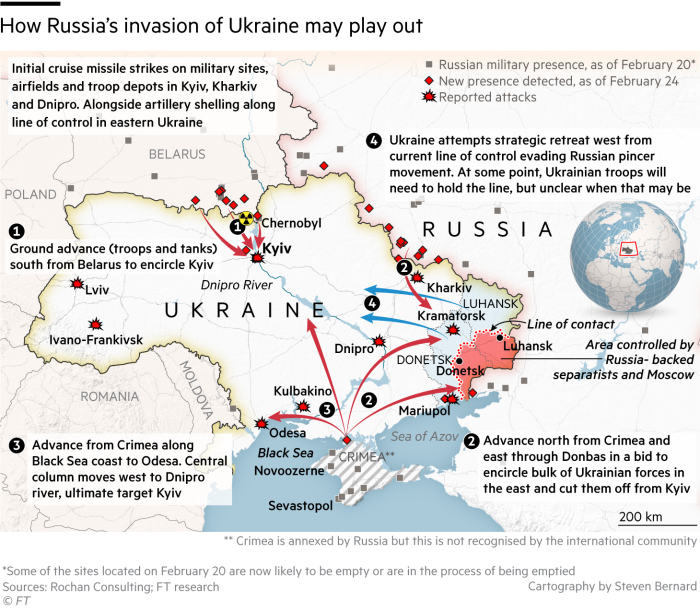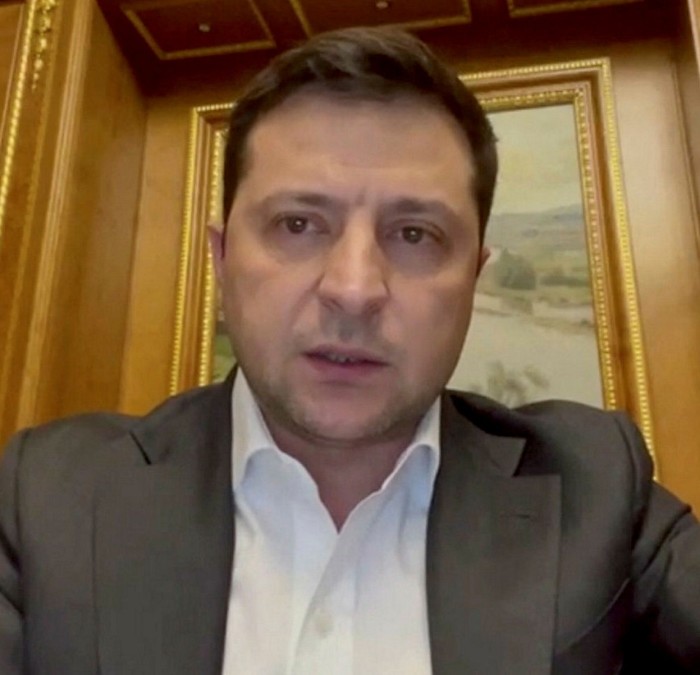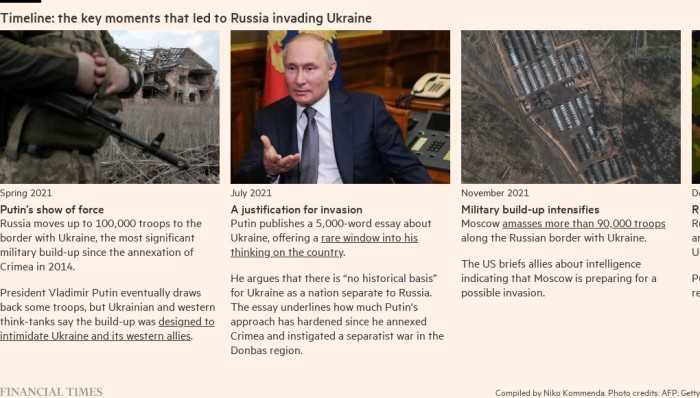Vladimir Putin’s forces stormed Ukraine and mobilised for an overwhelming assault on Kyiv as Russia unleashed one of Europe’s largest military offensives since the second world war.
After air and missile strikes, Russian troops launched attacks from Ukraine’s northern border with Belarus, across its eastern frontier with Russia and in the south from Crimea, the Ukrainian peninsula that Russia invaded and annexed in 2014.
Columns of Russian tanks and armoured vehicles later rolled into the country from all three fronts, while fighter jets, airborne troops and dozens of helicopters attacked a key airport outside Kyiv. Senior western officials warned that Russia was assembling an “overwhelming force” to take the capital, potentially within days.
Shocked by the ferocity of Russia’s assault, world leaders addressed their nations to condemn what they cast as the most momentous challenge to the postwar order in Europe for 80 years. “He has much larger ambitions than Ukraine,” said Joe Biden, US president. “He wants to, in fact, re-establish the former Soviet Union. That’s what this is about.”
Biden said the US and its allies would impose new sanctions on Russia in response to Russia’s aggression. “Putin chose this war and now he and his country will bear the consequences.”
Roads out of Kyiv were gridlocked with civilians fleeing the capital, while city authorities ordered residents to seek refuge in basements and bomb shelters.
Volodymyr Zelensky, Ukraine’s president, called on “everyone with battle experience” to take up arms and resist forces that had invaded the country “just as fascist Germany did”.
Alarm over the conflict ripped through international markets, with the price of European natural gas contracts jumping as much as 70 per cent to €142 per megawatt hour. Russia is a key producer of raw materials, with Europe relying on the country for about a quarter of its oil and more than a third of its gas.

Brent crude prices rose to more than $105 a barrel, the first time the international oil benchmark has crossed the $100 threshold since 2014. But the price dropped back to about $99 after the Biden administration announced a raft of sanctions that focused on Russia’s financial sector, rather than its energy industry, which is an important supplier to many western countries.
The pattern of Russian incursions suggested that its forces aim to advance south towards Kyiv, while simultaneously moving to encircle Ukraine’s forces in the east by cutting through the country from the Russian border to the Black Sea. Ukrainian authorities reported scores of casualties in fierce fighting across the country.
One senior US defence official said the initial campaign was “clearly designed to take key population centres”, with the intention of ultimately “decapitating the government” in Kyiv.
Russian forces pushed for control over territory around the regions of Chernihiv in the north, Kherson in the south, and around the major north-eastern city of Kharkiv, which saw some of the heaviest fighting on the first day of clashes.
Jens Stoltenberg, Nato secretary-general, condemned Russia for shattering the peace in Europe with a “brutal act of war”. In an emergency meeting, the US-led military alliance decided to deploy additional land, air and sea forces to bolster its eastern flank with Russia.
A US defence official said the Pentagon would send 7,000 more US troops to Germany. The purpose of the new deployment was to “reassure Nato allies, deter Russian aggression and be prepared to support a range of requirements in the region”.
In an address on state television on Thursday morning, Putin said that Moscow would “de-Nazify” Ukraine and “defend” victims of “genocide”, despite there being no evidence of such crimes.
After referring to Russia’s nuclear arsenal, Putin warned other countries against “the temptation of meddling” and said the country’s response would “lead you to consequences that you have never encountered in your history”.
Western leaders responded to the events with outrage. Boris Johnson, UK prime minister, promised sanctions to “hobble” Russia as he called on the west to ensure that “this hideous and barbaric venture” ends “in failure”.
Europe braced for a humanitarian crisis in the aftermath of the invasion. Slovakia said that its border with Ukraine was open for “all persons fleeing this war”. The US has warned that as many as 5mn Ukrainians could be displaced.

The Russian assault began with missiles, launched from land and sea, hitting about a dozen airfields across the country, including Kyiv’s airport Boryspil and facilities in the Black Sea port city of Odesa. US defence officials estimate that 100 missiles were fired in the initial assault.
By late morning, dozens of Russian helicopters had begun attacking Hostomel airport in a suburb north of Kyiv.
Ukrainian authorities said the country’s armed forces were resisting the invasion, making unconfirmed claims that they had destroyed tanks, aircraft and helicopters. Russia has denied such losses.
Oleksiy Arestovych, an adviser in Zelensky’s office, said more than 40 Ukrainian army servicemen had been killed defending territory and critical infrastructure.
Brussels will present “massive and targeted” measures to EU leaders for their approval at an extraordinary summit later on Thursday, said Ursula von der Leyen, European Commission president.
Russia claims, based on little or no evidence, that Ukraine is attacking the separatist-held territories in the Donbas, where more than 14,000 people have died in a conflict that broke out after the annexation of Crimea.
Nato will hold an emergency summit of its members’ 30 leaders on Friday to discuss what the alliance’s head described as Russia’s “deliberate, cold-blooded and long-planned invasion” of Ukraine.
The US has for weeks warned that Putin was preparing for an invasion, after he deployed more than 150,000 troops on the Ukraine border. Until as recently as this week, Russia rejected claims that it had any such plans.
At an emergency meeting of the UN Security Council shortly before the Russian attacks, Sergiy Kyslytsya, Ukraine’s ambassador to the UN, told his Russian counterpart: “There is no purgatory for war criminals. They go straight to hell.”
Vassily Nebenzia, Russia’s ambassador, replied: “This isn’t called a war. This is called a special military operation in the Donbas.”
Additional reporting by Demetri Sevastopulo and Aime Williams in Washington
https://news.google.com/__i/rss/rd/articles/CBMiP2h0dHBzOi8vd3d3LmZ0LmNvbS9jb250ZW50LzA3YmJjNWM3LWU2MjAtNDczNC04M2I1LTdiYjI2MTM2M2MzNdIBAA?oc=5
2022-02-24 20:21:23Z
1312849362

Tidak ada komentar:
Posting Komentar